As badly as gray water tank odors in an RV can stink, their source can also be very difficult to sniff out! We’ve troubleshot a few different gray water tank odors in our RV over the past couple of decades, and we’ve managed to address them pretty easily. But recently we were faced with a new and highly elusive gray tank odor in our RV that required some serious sleuthing.
So, grab your Sherlock Holmes hat and magnifying glass, put on your wrinkled Columbo coat, tap into your inner Angela Lansbury/Jessica Fox, and sleuth along with us (yeah, we know there was no murder involved in this episode, but honestly – as gray water tank odors go, this one was a killer!).
Why Does My Gray Water Tank Smell?
Every RVer understands clearly why the contents of an RV black tank would smell. ???? Less clear is why gray water would stink as badly as it does. The reason is the mix of the contents.
Think about what goes down your sink and shower drains. Bacteria-filled dishwater, food particles, body oils, and soap. When this combination sits for any period of time, it’s a recipe for some deadly odors, especially if you’ve been out boondocking for a couple of weeks as we often do. The combination of long stays without dumping, and reduced water usage to enable the long stays, makes for a toxic brew.
Sure, there are ways to mitigate SOME of the odiferous contents of an RV’s gray water tank. You can be diligent about wiping food from plates, pots, and pans prior to washing them in your kitchen sink, for example. You can also use a product like Happy Campers holding tank treatment, which we’ve used and appreciated for a long time.
But usually, when gray water tank odors escape from the gray water tank and invade your RV’s living space, you’ve got an issue that goes beyond the tank itself.
How Do You Get Rid of the Gray Tank Smell in an RV?
Having sleuthed this issue out in the past, we know that there are many ways for gray water tank odors to invade an RV. Likewise, there are several ways to get rid of the odors and to prevent them. We’ve been living in an RV full time for 18 years, after all. This isn’t our first gray tank stink rodeo. We’ve got some experience here. Let’s take a look.
Sleuthing Out the Culprit of Gray Water Odors
Let’s see if we can solve the latest gray water tank crime by looking at the evidence and ruling out the suspects one by one.
1. Colonel Mustard in the Kitchen with the Air Admittance Valves
The first time this happened to us, our air admittance valve had failed. We created a post and video as a result of our experience in which we show you how to repair this issue, so you’ll want to check out if you’re troubleshooting a similar odor.
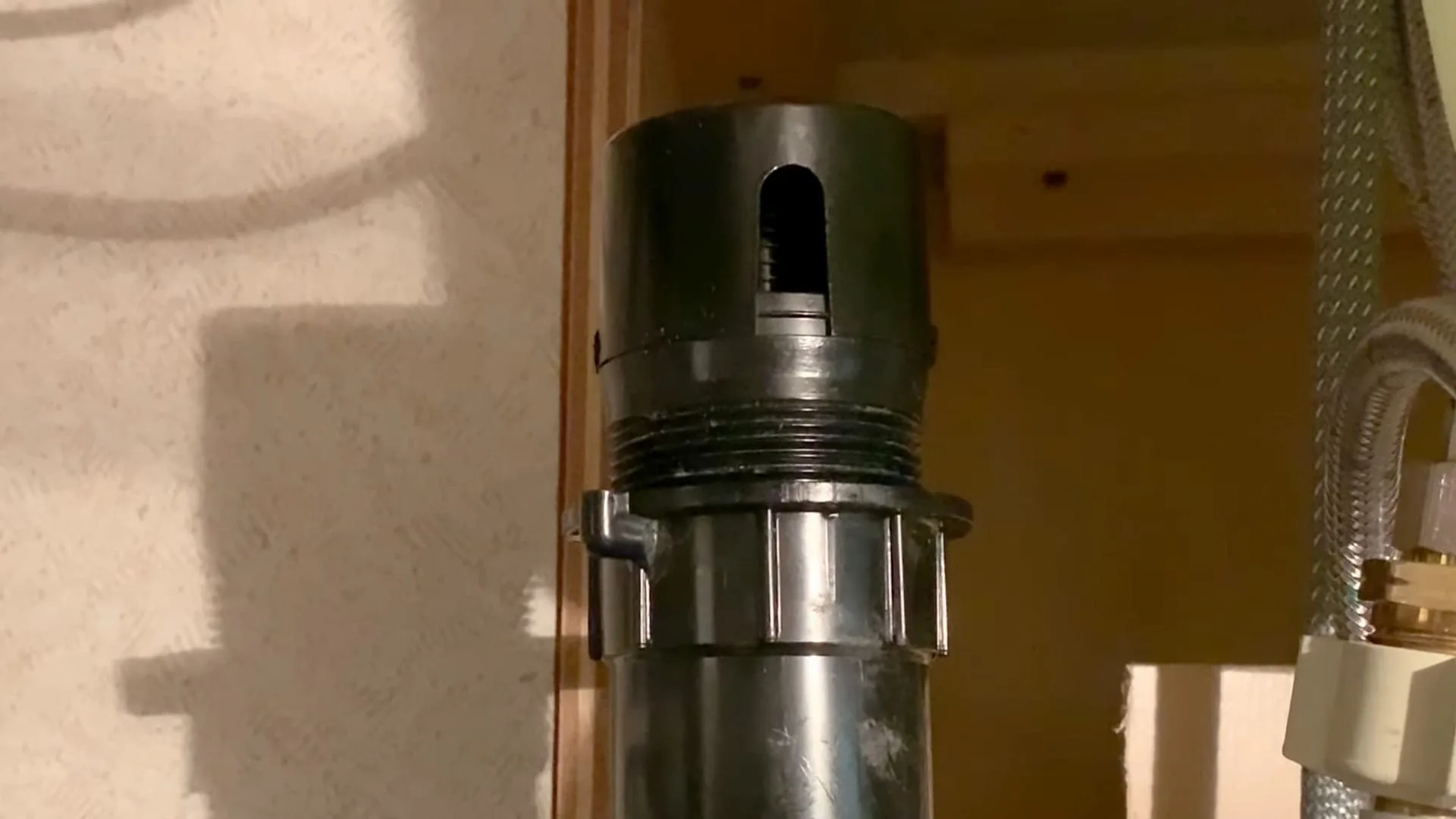
Air admittance valves are important components of every plumbing system, whether residential or RV.
Air admittance valves are critical components of all plumbing systems, residential and RV. They allow air into the system through a one-way valve, allowing water to flow smoothly, and preventing the formation of a vacuum in the plumbing system. Without them, a large flow of water down the drain could siphon the water out of the p-trap. If that happens, odors from the gray tank can escape through the drain in your sink. And that’s exactly what happened to us, THAT time.
Your air admittance valve is a key suspect if you’ve got gray water tank odors in your RV. We replaced our air admittance valve and the problem was solved.
- Compact air admittance valve with ABS adapter; ideal for a single fixture or group of fixtures up to 20 DFUs (drain fixture units) on a branch
- Creates ventilation that prevents the loss of water seal in trap
2. Miss Scarlet on the Roof with the Plumbing Vents
Another possible suspect to consider when you’ve got a gray water tank odor in your RV is the plumbing vent. Depending on the size of your RV, you may have one or two (typically, there’s at least one vent for each black & gray tank in your RV, although some manufacturers plumb the lines together to a single vent penetrating the roof).
We’ve experienced this problem as well, and again we created a post and video about replacing our plumbing vents which addressed the problem for us – THAT time.
Adequate air circulation is an essential part of the design of an RV. Most RVs have several rooftop openings and items that are dedicated to the proper movement of air. At least one of these openings on every RV is an RV plumbing vent. In our case we have three, and once we replaced them all with 360 Siphon vents, the problem went away.
360 Siphon vents come in black and white and are, by far, our favorite plumbing vents. The technology is largely unmatched for carrying odors up from your gray tank and out of your RV… without requiring any power or having any moving parts.
- ELIMINATES ODOR - Exhausts odors out the roof vent before they have a chance to invade your RV
- COMPATIBILITY - Engineered for a universal fit, the 360 Siphon is compatible with all RV vent caps
- Eliminates Odor - Exhausts Odors Out The Roof Vent Before They Have A Chance To Invade Your Rv
- Compatibility - Engineered For A Universal Fit, The 360 Siphon Is Compatible With All Rv Vent Caps
These vents solved our issue back then, and our RV has been stink-free ever since…until now! This time Miss Scarlett is not the culprit for us, but if you’re experiencing a gray water tank odor in your RV, you may wish to consider switching to 360 Siphon vents.
Again, check out our post and video – they explain everything. If you’re capable of accessing your RV’s roof, all you’ll need to do the job are a couple of basic tools and a caulk gun loaded up with some Dicor Self-Leveling Lap Sealant, and you’ll be good to go for this simple and highly effective DIY project.
HOWEVER – we had to continue to sleuth because this was not the issue for us.
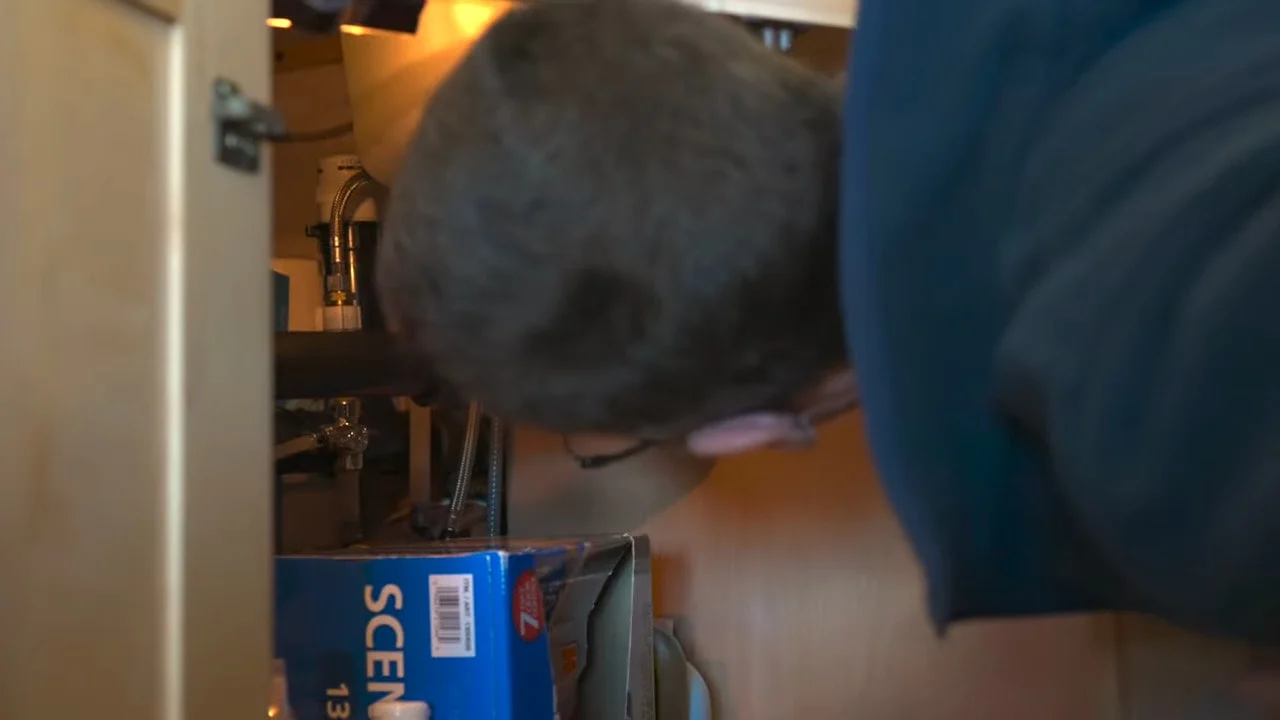
When sleuthing a mysterious odor, putting your sniff detector to work is important!
3. Professor Plum in the Kitchen… Sniffing Around For Clues
When you’ve got an odor coming from your gray tank into your RV, it makes sense to look at any area of the plumbing system where there’s an opening (like the air admittance valves or the plumbing vents).
But if you’ve troubleshot all of the open areas of your plumbing and you STILL haven’t solved the problem, where else could you look? Surely, the odors couldn’t be coming from any of the areas where there are solid pipes, because if a broken pipe was the culprit, you’d have a water leak somewhere. OR WOULD YOU?
Let’s sift through the evidence in our case:
- Air admittance valve? No problem.
- Plumbing vents? No problem.
- Leaks? None.
- When did we get the odor? Mainly when we would pull away from an off-grid site with a half or full gray water tank, after a long period of boondocking.
- Did the odor continue as we were driving down the highway? No.
- When was the smell the worst? As soon as we started pulling away from the campsite.
- Did it happen when we pulled away from a campground with full hookups? No, because we had an empty gray tank.
- Where is the odor specifically coming from? From behind the kitchen sink and behind the kitchen slide, in the space between the wall and where the slide comes in.
Aaaaaah HA! It’s Professor Plum in the Kitchen! Watch the video below for more!
Our kitchen is on a slide. For this reason, the drain has to have a flexible section of pipe that moves with the slide as it extends and retracts. In fact, about ten years ago we replaced our flexible PVC drain line because we had a leak in that area. But this time we had no leak at all. That was the real mystery.
However, as it turns out, our flexible pipe had flexed so frequently that the pipe had indeed cracked, but it had cracked on the TOP of the flexible PVC pipe.
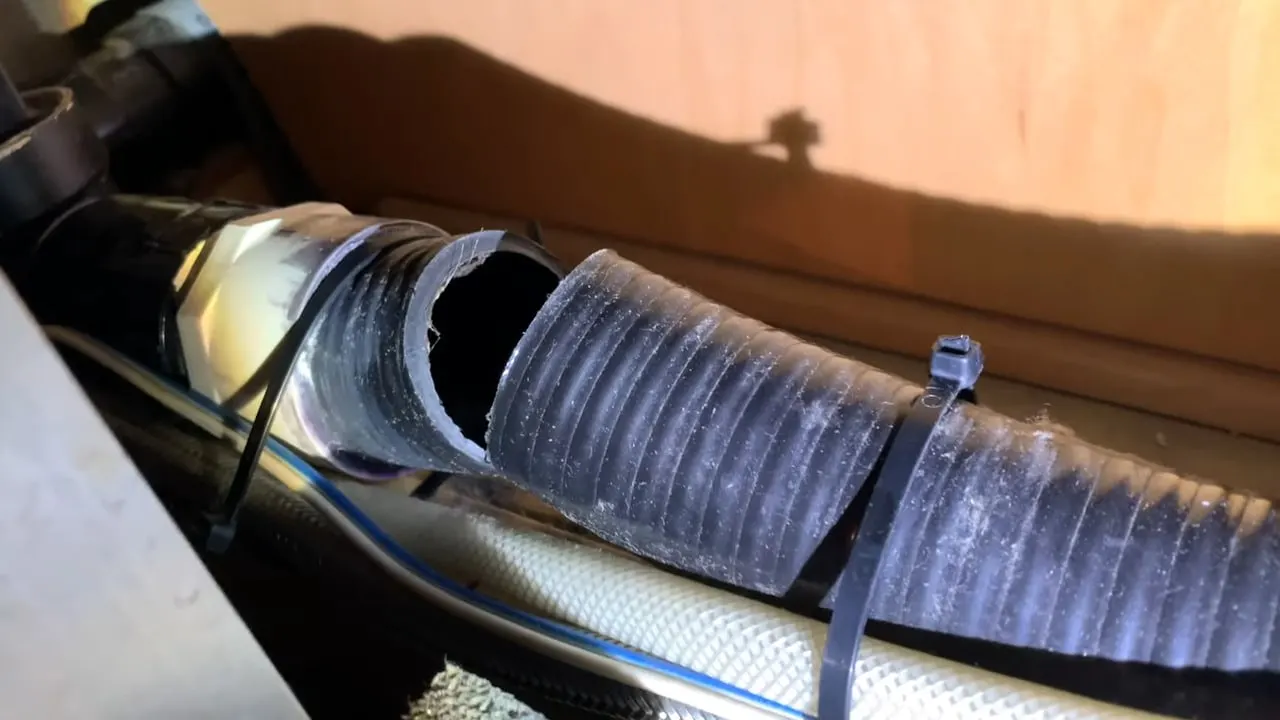
Over a ten-year period, this flexible PVC pipe cracked open on the top.
So, we didn’t have a leak because the water was contained in a little gully of pipe that served as an aqueduct as the water flowed through it.
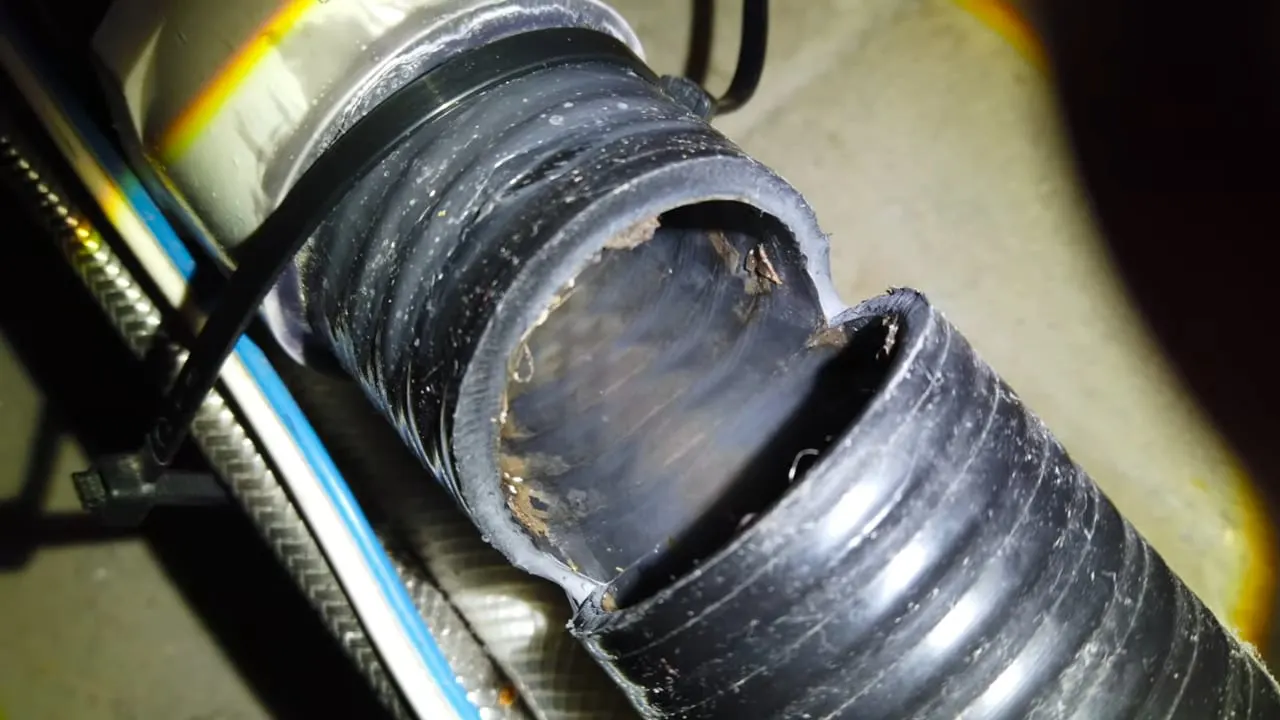
Because the pipe cracked on top, it formed a gully on the bottom of the pipe through which water could flow without leaking.
The issue only occurred when the slide was IN/RETRACTED. When the slide was extended, and we were stationary at our campsite, we wouldn’t be smelling gray tank odors. That’s because with the slide out, the flexible sewer line was bent upwards and the two sides of the crack would be compressed together.
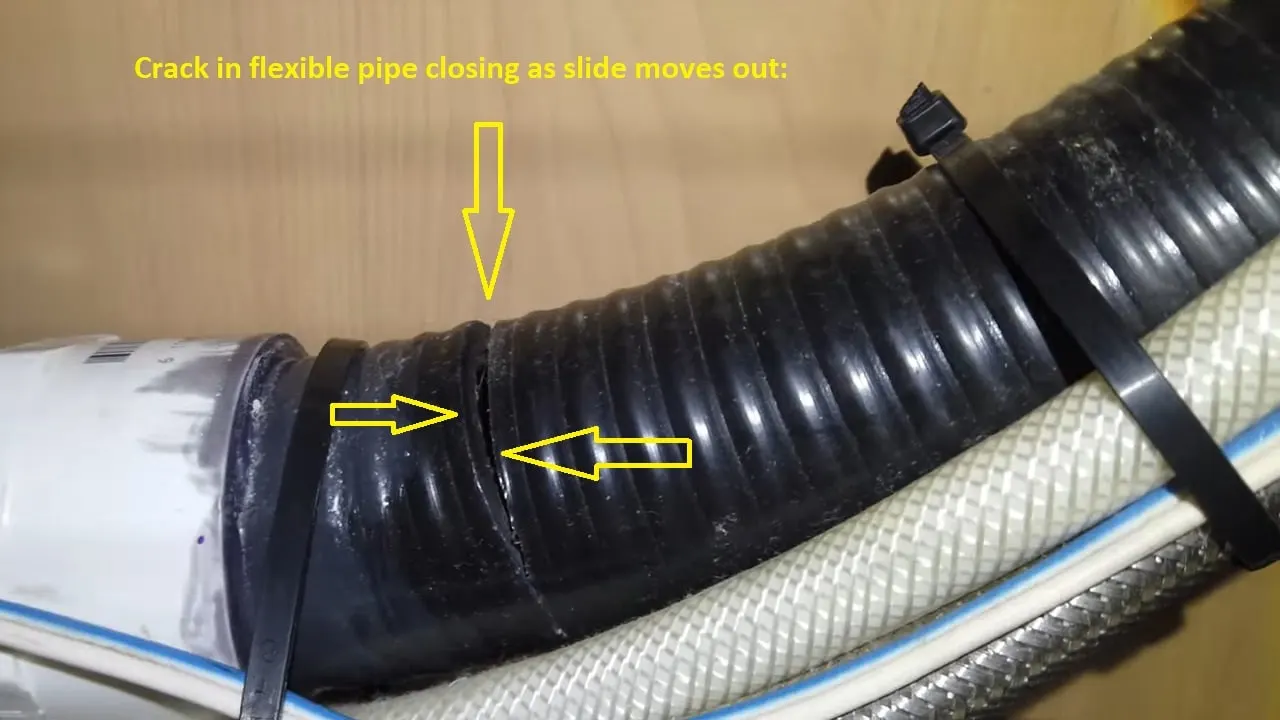
Here you can see the crack in the top of the sewer line closing up as the slide was extended… which is why there wasn’t any odor when we were stationary.
If you’re wondering why we weren’t smelling the gray tank odor when we were traveling down the highway, it’s due to the fact that the rapid flow of air across our 360 Siphon vents created such a strong updraft through the plumbing system that it would pull the odorous air up and out of the RV.
While this is unlikely to be the result of a mystery that you find yourself troubleshooting, it’s worth having a heads up in case you find yourself scratching your head over a gray water tank odor in your RV.
In our case, the way we resolved this issue is by replacing the 3-foot flexible PVC pipe. This time, we’re using a 4-foot length to allow the pipe more room to flex without stressing the PVC.
But if you’ve ruled out the air admittance valves (we show you how to test that in the video embedded above) and you’ve got high-quality vents like the 360 Siphon vents installed, and your issue isn’t in the plumbing situated in a slide like ours, there are other ways to address gray water tank odors in your RV.
How Do You Fix a Gray Water Tank That Smells?
Another way to deal with gray tank odors is to clean your gray tank sensors. Cleaning the sidewalls of the tank may be very helpful in getting rid of odors, as the buildup of organic matter and bacteria over time can lead to a nasty stench.
In this post, we show you four different ways to clean your RV tank sensors, including having your tanks pressure washed, especially if that’s never been done.
Conclusion to Our Sleuthing
We thought this post and video were worth creating in case the information is helpful to even a few of our fellow RVers seeking to solve The Mystery of the Stinky Rig. Don’t just blame Mrs. Peacock in the library with a stink bomb, get out your sleuthing hat and start sleuthing, armed with our posts and videos.
Geek Out with Us Every Week
Join our newsletter to learn about all things RV-related. Every week we offer free tips, tricks, product reviews, and more to our online community of RVers. So, whether this is your first time on the road or you’re a seasoned expert, we’d love for you to geek out with us!





Alan Mcneil
Monday 19th of September 2022
The RV Geeks, I have a sewer smell only while camper in rv redort in Fla. The smell in near a dresder cabniet. Not nesr the commode. The bathroom does not smell. I have done all the normal things: use spray wand to clean black tank, changed treatment chemicals, new type 360 vent. Made sure vents are clear, put bleach in all my pea traps, use a water filter. The smell goes away once i drain my black water and gray water tank but comes back in 3 days it the air temp is 90 or above. Wife wants to sell camper. Any help is appreciated.
Jodine Bliss
Sunday 21st of November 2021
We are getting a terrible odor from the upper cabinets above the sink. There is no air admittance valve under the sink and we went up on top of the roof and the vents look good. They are sealed well and don’t move. We have a fifth wheel and the sink is on the interior wall opposite the bathroom so we’re not sure why any odors are getting into our sealed upper cabinets. There is no odor coming from under the sink. it was really bad for a few weeks this past summer as we were stationary but Boondocking. It went away for many months and just yesterday it started again from the same upper cabinets. We are on the road driving today and the odor is increasing in potency. Any suggestions?
TheRVgeeks
Sunday 21st of November 2021
Hi Jodine. Sorry to hear about your issue... we know how annoying it can be to try and track these things down. A couple of thoughts on what it could be...
Is it possible the odor is coming from the roof vents and entering the RV through an open roof vent fan? We've had that situation occasionally, where the wind shifts in just the right direction to blow odor from the vent pipe into the open fan when it's not running. Since your sink is on a wall shared with the bathroom, it's quite likely that a tank/plumbing vent pipe is going up through that wall to the roof vent. It's possible that the vent pipe has slid down away from the roof vent itself, allowing tank odor to escape into that shared wall... and the way out must be through an opening that may not be visible in/behind the cabinet. To determine that, you'd have to remove the roof vent and inspect to be sure the vent pipe itself comes all the way up. You could also try and see if you can get to the top of the tanks below the floor level there (in a fifth, there's likely a gray tank located in close proximity to the kitchen/bathroom wall) and see if the vent pipe is properly sealed to the tank.Those would be our guesses based on what you've described. Hope that helps... and that you find (and FIX!) the source of the odor!
Terry
Monday 25th of October 2021
Hi Guys, I recently took my RV out for an exercise run before winterizing it. I thought my p-traps had dried out. I have been running my dehumidifier a lot while my RV has been parked at home. I thought that was the cause. I recently replaced the AAV's because we had a slight odor on our last camping trip and I saw your video. Plus our drains are gurgling while draining. The gurgling did not stop after replacing the AAV's. I even tried snaking the drains with no change. I watched your video in the morning and asked my wife to watch your video with me again in the evening. I have to laugh, my wife asked me after watching your video in the morning why I had not gotten in the RV looking at our line :-)
TheRVgeeks
Monday 25th of October 2021
Oh now, Terry. We feel for you trying to hunt down the source of odors... ours eluded us for a LONG time and many drives spent with our noses crinkled from the smell. ???????? Prior to finding our problem, we dismantled the plumbing under the kitchen sink entirely and cleaned it all within an inch of its life... thinking the odor was coming up through the plumbing. Well... that wasn't the problem, but our plumbing is nice and clean now! ????
Hope you find the source of your issue!
Terry
Monday 25th of October 2021
This is Terry again, I just inspected my drain line and it appears to have the same type of crack that your line had back in 2011. My line is tucked under the water heater in the back corner with no access. The only reason I can now see that there is a leak is the recent pink colored antifreeze I put into the drain. My drain line lays on its side. This should be a "fun" problem to fix. I recently replaced my water heater, and if I had known then that my drain line was leaking that would of made things easier. Where did you guys get your replacement line and fittings? You guys want to come visit and give me a hand? LOL
Drew
Sunday 24th of October 2021
Good work finding the source. I used to look for floor plans that didn't include anything except wires in the slide rooms for this reason but today especially you'd be hard pressed to find any like that. Lucky ours is pretty simple. Maybe you didn't use as many ty raps this time so that the conduit can bend more freely.:)
TheRVgeeks
Sunday 24th of October 2021
Very true, Drew. Seems like almost every floorplan has some kind of plumbing in a slide these days (hope they've come up with some new systems for enabling the plumbing to flex). We did use a few less zip-ties/tie-wraps this time... but they aren't really an issue as they're just holding all the lines to each other (loosely) and aren't anchoring anything in place. Fingers crossed this repair lasts longer than the last one. ????????
JohnnyG
Sunday 24th of October 2021
My problem was an odor when going down the road. I went through many of the same steps. I replaced my Air Admittance Valves (all 3) and even temporarily caped them off. I added 3 vents caps on the roof. Still no love. One day, when using the black tank wash, water started to come out of the compartment light. Directly above that light is the bathroom sink. I found a new system that I did know about, the black tank wash anti siphon valve. I ordered one from Amazon and have since driven across the country... the smell is gone. It's hard to believe that I am still finding systems after 5 years of full-timing in this rig.
TheRVgeeks
Sunday 24th of October 2021
Oh wow, Johnny. That IS a tough one! We just had to replace that anti-siphon valve on a friend's RV... it was leaking, but the water from the leak was running down the lines and coming out in a hidden place in the water bay. Took them quite a while to locate the source. They were lucky it wasn't letting odor in! So glad you found (and solved) the source of the odor. It can be SOOOOO frustrating trying to isolate them!